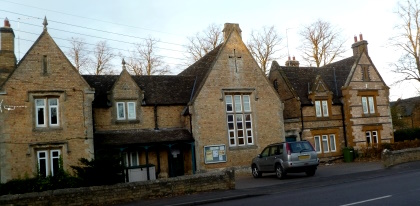
Home

The Great Commandment
Mark 12.28-35
Good News Translation (GNT)
*************************
28 A teacher of the Law was there who heard the
discussion. He saw that Jesus had given the
Sadducees a good answer, so he came to him
with a question: "Which commandment is the
most important of all?"
29 Jesus replied, "The most important one is this:
'Listen, Israel! The Lord our God is the only
Lord. [a]
30 Love the Lord your God with all your heart,
with all your soul, with all your mind, and with
all your strength.'
31 The second most important commandment is
this: 'Love your neighbour as you love
yourself.' There is no other commandment
more important than these two."
32 The teacher of the Law said to Jesus,
"Well done, Teacher! It is true, as you say,
that only the Lord is God and that there is no
other god but he.
33 And you must love God with all your heart and
with all your mind and with all your strength;
and you must love your neighbour as you love
yourself. It is more important to obey these
two commandments than to offer on the altar
animals and other sacrifices to God."
34 Jesus noticed how wise his answer was, and
so he told him, "You are not far from the
Kingdom of God."
35 After this nobody dared to ask Jesus any more
questions.
Footnotes
Mark 12:29 The Lord our God is the only Lord;
or The Lord is our God, the Lord alone.
*************************
Commentary taken from
'The Applied New Testament Commentary'
(Kingsway)
The Great Commandment
Mark 12:28-35
The Jews considered themselves righteous.
They were careful to obey the commandments written in the Jewish law.
The Jews considered the ten commandments very important (Exodus 20:1-17), and also the laws concerning sacrifices and offerings.
If a Jew obeyed the ten commandments and performed all the proper sacrifices and offerings, he could be called "righteous."
But here in verse 30, one of the most important verses in the entire Bible, Jesus teaches that there is a higher law, a greater law:
to love God. More than sacrifices and offerings, God wants our love.
In fact, the Jews knew about this law. It is written in Deuteronomy 6:4-5, and devout Jews repeated it out loud twice a day.
But they didn't consider it the highest law, a law from which all other laws were derived
(Matthew 22:40).
Love the Lord your God.
How much of our love does God want?
All of it. Four times the word "all" is repeated here.
We are to give God all our love; that means we are not to keep back any love for ourselves.
We are to love God with our whole life-heart, soul, mind, strength.
We are to give our lives in love to God.
God doesn't want animal sacrifices;
He wants human sacrifices! He wants us to give ourselves as living sacrifices to Him.
If we say we have given our life to God, how can we then keep back other things for ourselves?
How can we say, "This is my house, my radio, my job, my honour, my future?
If we belong to God, then all these things belong to Him too.
A question arises here: How can we show our love for God?
It is easy to say, "I love God," but what does that really mean?
To love God means to obey God.
If we do not obey God, we do not love Him.
Obedience is the proof and demonstration of our love (John 14:15,21,23-24).
However, our obedience must not be like that of the Pharisees and teachers of the law.
They obeyed God not because they loved God, but to show other men how religious they were (see Matthew 5:20).
Then Jesus gave a second command: "Love your neighbour as yourself" (Leviticus 19:18).
Our love for God must be demonstrated in our love for other people.
The last six of the ten commandments are concerned with loving our neighbour (Exodus 20:12-17).
The first four are concerned with loving God (Exodus 20:3-4,7-8).
Therefore, Jesus said in Matthew 22:40, "All the Law and the Prophets hang on these two commandments".
How must we love our neighbour?
As we love ourselves.
What we would want for ourselves, we must want for our neighbour.
Jesus did not say: "Love yourself and your neighbour equally."
He said: "Love your neighbour as if he were yourself"
The natural worldly man loves himself first of all.
That is how we should love our neighbour - first of all, after God.
The Christian must love his neighbour more than himself.
In fact, the Christian should no longer love himself at all.
The Christian is called to deny himself (Mark 8:34), and to give all his love to God and his neighbour.
We must love each other as Jesus loved us.
Jesus loved us so much that He gave His life for us (1 John 3:16).
Love your neighbour as yourself.
Who is our neighbour?
The Jews considered only other Jews to be their neighbours.
But Jesus taught that all men are our neighbours, especially those in any kind of need (see Luke 10:25-37).
These two great commandments to love God and to love our neighbour are, in essence, one command.
To love God and to love other men must always go together.
We do not truly love God if we do not love our neighbour.
If anyone says, "I love God," yet hates his brother, he is a liar (see 1 John 4:20-21).
Then again, many people make the opposite error: they try to show love to others without loving God.
This is a humanitarian "love," and it does not last.
All true love flows out of our love for God and our faith in Him.
John wrote that love comes from God (1 John 4:7).
Paul wrote: God has poured out His love into our hearts by the Holy Spirit, whom He has given us (Romans 5:5).
When we truly love our neighbour, it is not with our own selfish human love that we love him, but with God's love given to us through the Holy Spirit which dwells within us.
We are like pipes or channels through which God's love can flow to other people.
May our constant prayer be that we might remain open channels and that nothing might block the flow of God's love through us.
Water cannot flow into a pipe that is blocked at one end.
In the same way, if love does not flow out from us, God's love cannot flow in.
The teacher of the law who had asked Jesus, "Which is the greatest commandment?" understood Jesus' answer.
He spoke correctly when he said that to love God was more important than all burnt offerings and sacrifices.
God Himself spoke through the prophet Hosea saying: "I desire mercy, not sacrifice, and acknowledgment of God rather than burnt offerings" (Hosea 6:6).
And in the book of 1 Samuel, Samuel says: "Does the Lord delight in burnt offerings and sacrifices as much as in obeying the voice of the Lord?
To obey is better than sacrifice, and to heed is better than the fat of rams" (1 Samuel 15:22).
Then Jesus, seeing that the teacher of the law had answered wisely, said to him, "You are not far from the kingdom of God."
Other versions are available here
Return to the Home Page

Contact the Rector
The Revd.Nic.Edwards
The Rectory,
Church Lane,
BUGBROOKE,
Northampton,
NN7 3PB
Land Line: 01604 - 815496
(Can be accessed from the mobile device)
Mobile: .....
E-mail:
thebeneficeofbhkandr at gmail dot com
Contact the Benefice Office
Sunday School Rooms, Church Lane,
BUGBROOKE, Northampton, NN7 3PB
Land Line: 01604 830373
E-mail:
thebeneficeofbhkandr at gmail dot com
Mon., Tues., Wed., Thur.
9:00am to 11:30am

For Baptism bookings (Christenings)
to arrange an appointment please contact
the Benefice Office.
For Wedding bookings:
please contact the Benefice Office to arrange
an appointment.
Who Made This?
Seeing as you asked, if you can give helpful
advice or report factual corrections and
'deliberate mistakes',email:-
regparker3 at gmail dot com
Email addresses shown using words in an
attempt to avoid 'spam',
Type the email address replacing 'at' with '@',
and 'dot' with '.'
|



